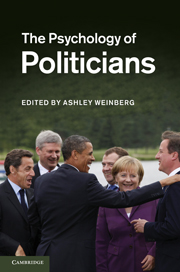Book contents
- Frontmatter
- Contents
- Figures
- Tables
- Acknowledgements
- Contributors
- 1 The psychology of politicians
- Part I Becoming politicians
- Part II Being at the centre of things
- 4 What makes a successful politician?
- 5 Cognitive skills and motivation to adapt to social change among Polish politicians
- 6 Political leadership and its development
- Part III Coping with pressure?
- Part IV People as politicians
- Index
- References
5 - Cognitive skills and motivation to adapt to social change among Polish politicians
Published online by Cambridge University Press: 05 December 2011
- Frontmatter
- Contents
- Figures
- Tables
- Acknowledgements
- Contributors
- 1 The psychology of politicians
- Part I Becoming politicians
- Part II Being at the centre of things
- 4 What makes a successful politician?
- 5 Cognitive skills and motivation to adapt to social change among Polish politicians
- 6 Political leadership and its development
- Part III Coping with pressure?
- Part IV People as politicians
- Index
- References
Summary
For decades researchers analysing people’s functioning in the domain of politics have been looking for an answer to the question whether members and supporters of different political opinions, ranging across the continuum from political left to right, also differ with respect to their cognitive complexity and the sophistication with which they approach political problems (e.g., Stone, 1980; Jost, Glaser, Kruglanski and Sulloway, 2003a, 2003b). In this chapter, it is argued that complexity of political judgement is shaped by individuals’ cognitive abilities (Rosenberg, 1989; Sidanius, 1988; Sidanius and Lau, 1989) and that epistemic motivation (Kruglanski and Webster, 1996) – the will to engage with knowledge – determines the extent to which available cognitive skills are used. When analysing differences in cognitive skills the question is posed whether politicians differ with respect to their cognitive potential and when looking at differences in epistemic motivation, it is considered whether politicians differ with respect to their cognitive performance. The latter is easier to change and shape than the former, but both have consequences for the effectiveness of democratic debate.
This chapter is based on findings from two studies examining the cognitive abilities and epistemic motivations of members of the political elite in Poland, a former communist country that underwent a dramatic systemic change in the 1990s. The socio-political context of a post-communist country offers the possibility of new insights into the nature of the relationship between cognitive functioning and political preference unavailable within the context of established Western democracies (see also Golec, 2002b; Kossowska and van Hiel, 2003; McFarland, Ageyev and Abalakina-Paap, 1992; Tetlock, 1983, 1984).
- Type
- Chapter
- Information
- The Psychology of Politicians , pp. 76 - 96Publisher: Cambridge University PressPrint publication year: 2011

